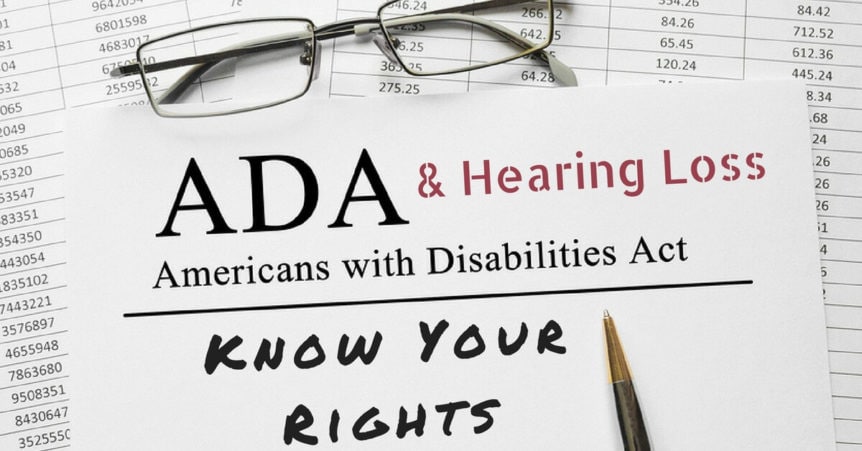- A Closer Look at Common Myths About Hearing Loss - May 7, 2024
- The Impact of Pets on Emotional and Hearing Health - April 26, 2024
- Strategies for Coping with Single-Sided Deafness - April 16, 2024
Have you ever felt discriminated against because of your hearing loss? Has your hearing health affected your work, or how you’re treated when you’re out and about? If you have hearing loss, you are protected by the Americans with Disabilities Act (ADA), which fights for the rights of those living with disabilities, including those who are deaf or hard of hearing.
Getting to Know the ADA
You know that struggling to hear doesn’t mean you’re any less intelligent than anyone else. You might need an extra minute to process what’s been said, or need something to be repeated, but you can still tell great jokes, and you’re still more than capable of doing a fantastic job at work.
Not only do you know these things, but legislation is in place to make sure you’re always treated fairly. The Americans with Disabilities Act (ADA) became law in 1990 to ensure the equal rights of all Americans, regardless of disability. Those who are deaf or hard of hearing are also protected under the ADA. Equal treatment means you have the right to equal access to education, opportunities, and jobs.
Finding a Job
Under the ADA, employers are required to treat all applicants equally, regardless of visible or invisible disabilities. For example, the employer is not allowed to ask you if you have hearing loss during the job interview or require you to take a hearing test before offering you employment. What they can do is ask about your ability to perform the job, and touch on subjects like communication skills and safety concerns.
Providing Accommodations
Did you know that it’s your employer’s responsibility to provide you with accommodations? If there are some small adjustments that can be made, like moving your desk further away from a noisy area, providing a sign language interpreter during meetings, or installing flashing lights for safety warnings, your employer must provide these accommodations to help you do your job well. However, they’re not required to make huge changes, and aren’t likely to undertake a remodeling project to accommodate your hearing needs.
Hearing Protection at Work
If you work in a noisy environment, it is your employer’s responsibility to provide appropriate hearing protection for all employees. The Centers of Disease Control and Prevention estimate that nearly $242 million is spent each year on workers compensation for preventable hearing loss! It’s your employer’s responsibility to provide hearing protection, but it’s your responsibility to ask for it, and make sure you are always protecting your hearing in dangerously loud workplaces.
The ADA and Public Buildings
Did you know that your right to equal access extends to public buildings as well? If you’re in a large theatre, you should have access to assistive services like closed captioning, or an assistive listening device. Museums are also required to provide hard of hearing patrons with an assistive listening device. Other places you can ask for accommodations include court rooms, conference halls, concert venues, convention centers, public transportation centers, and hospitals.
Ask for What You Need
Most employees, staff, and business owners want to do their part to make sure you are included in the community, are safe, and have access to the services you need. Most will gladly provide accommodations or assistance, so don’t be shy about asking for what you need.
Have You Faced Discrimination?
Now that you know your rights, do you think you’ve faced discrimination due to your hearing loss? If you face discrimination, either in an isolated incident or in an ongoing situation, take action and file a Title III complaint with the Department of Justice. Send a letter and be sure to include your full name and address, full name and address details of the business or institution that discriminated against you, and a description of what happened. Include the date of the event, as well as the names of all employers or employees involved in the incident.
Treating Hearing Loss
Knowing your rights is an important step in maintaining a happy, healthy life, but if you’re living with untreated hearing loss the best thing you can do is get hearing aids. These sophisticated devices are like tiny computer chips that will change your life, and give you back your ability to communicate, work, and interact with your community easily. Visit us at New Leaf Hearing Clinic to get started today.

